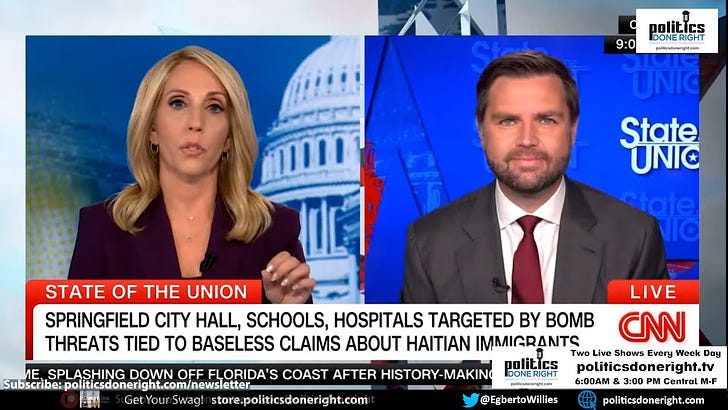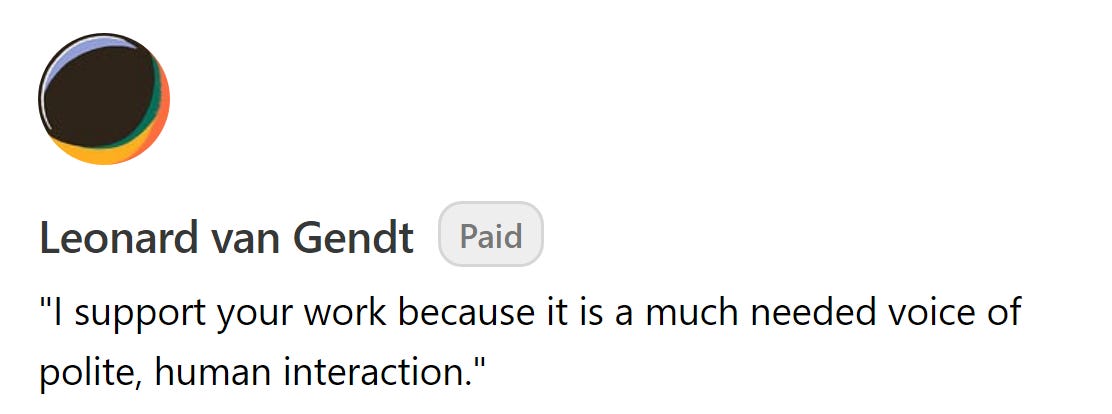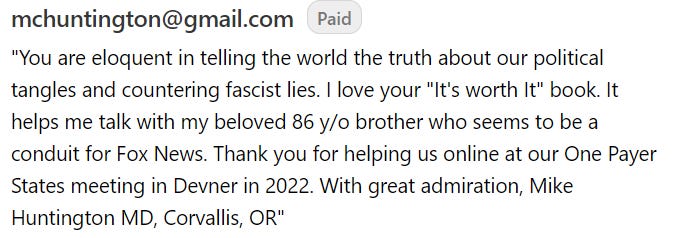CNN’s Dana Bash destroyed a lying JD Vance, and he accidentally confessed to creating stories.
CNN’s Dana Bash completely annihilated JD Vance in an interview. Vance was so flustered that he had a Freudian slip and said he created stories.
YOU CAN MAKE THE DIFFERENCE: This Project needs 25 new paid members today. Would you be willing to be one?
We are grateful for our Paid Subscribers and Free Subscribers. In this political climate, we need several hundred more Paid Subscribers. Misinformation funded by the deep pockets of our Oligarchy floods the internet. We are using all our platforms on-air, online, and in publications to counter that. We ask that you invest the equivalent of less than a coffee to ensure we can keep doing this effectively. Please invest in a Democracy that serves all of us by becoming a paid subscriber. It comes with many benefits.
Dana Bash completely annihilated JD Vance.
In a recent interview, CNN’s Dana Bash demonstrated the importance of robust journalism when she held Ohio Senator JD Vance accountable for his inflammatory rhetoric. Vance, a Republican who has been at the forefront of spreading baseless claims about Haitian immigrants in his state, found himself caught in a web of his own making when Bash confronted him with facts and pressed him on his harmful statements. In a moment of apparent frustration, Vance accidentally admitted that he had “created stories” to force media attention, a Freudian slip that revealed more about his intentions than he likely intended.
Vance’s rhetoric had long focused on painting a bleak and exaggerated picture of Haitian immigrants in Ohio, claiming that they were overwhelming local resources in Springfield, Ohio, and even insinuating that they were responsible for bizarre acts like eating dogs and cats. These wild assertions were repeated by former President Donald Trump on a debate stage, amplifying their reach and creating real-world consequences for the community. During the interview, Vance was visibly disoriented by Bash’s pointed questioning, particularly when she cited local officials who had found no evidence to support his claims. The interview quickly unraveled for Vance as Bash, armed with facts, debunked his narrative point by point.
One of the most revealing moments occurred when Bash questioned Vance about an incident involving an 11-year-old boy named Aiden Clark, who was tragically killed in a car accident involving a Haitian immigrant. Vance had previously referred to the incident as a murder, but the boy’s father had made it clear that it was an accident and had publicly asked politicians to stop using his son’s name for political gain. This, however, did not deter Vance from exploiting the tragedy for his agenda. When Bash pressed him to apologize, Vance sidestepped the request and doubled down on his rhetoric, insisting that he would continue talking about what he perceived as the harm caused by migrants in the area.
Vance’s behavior in the interview mirrored the broader strategy of many on the far-right, who often traffic in fearmongering and xenophobic narratives to rile up their base. The tactic, used by figures like Trump, involves making sensational and baseless claims, knowing that the initial shock value will capture media attention, even if the claims are later debunked. This is precisely what Vance admitted to, albeit unintentionally, when he told Bash, “If I have to create stories so that the American media actually pays attention to the suffering of the American people, then that’s what I’m going to do.” Bash, sharp and unrelenting, seized on this moment, pointing out that Vance had essentially confessed to fabricating stories.
This moment underscores the dangerous and cynical approach that many on the far-right have adopted in recent years. The willingness to distort facts, manipulate tragedies, and stoke racial animus is not new, but it has been amplified in the age of Trumpism. Vance’s admission that he is willing to “create stories” reflects a broader trend in which truth becomes secondary to political expediency. For politicians like Vance, the end—galvanizing their political base and sowing fear—justifies the means, even if it means spreading lies that can have real, dangerous consequences.
This Bash interview was a virtual clinic with a few exceptions in holding public figures accountable. Too often, politicians are allowed to spread disinformation unchallenged. Still, Bash did what many journalists aspire to do—she pressed Vance with facts, cited sources that contradicted his claims, and gave him no room to wiggle out of responsibility. In doing so, she did a service not just to her viewers but to the broader public discourse, reminding us of the critical role that journalism plays in maintaining a healthy democracy.
Vance’s slip of the tongue also points to a broader issue: the media’s responsibility in amplifying or debunking harmful narratives. While Vance accused the media of ignoring his stories, he was upset that they were not amplifying his falsehoods. By creating stories that stoke fear, politicians like Vance hope to force media outlets to cover them, knowing that the sensationalism will attract viewers. Bash’s refusal to play into this trap and insistence on sticking to the facts sets a vital precedent.
In the age of misinformation, journalists like Bash must continue to push back against the lies and distortions that have become all too common in political discourse. Vance’s admission that he is willing to fabricate stories for political gain should serve as a wake-up call for the media, the public, and lawmakers alike. The damage caused by such tactics is not just theoretical—it can lead to real harm, as evidenced by the bomb threats and other violent incidents that have followed the spread of Vance’s rhetoric.
Ultimately, the interview was a win for truth, accountability, and a reminder that journalists are still willing to confront lies head-on. Dana Bash’s interview with JD Vance will likely be remembered as a pivotal moment in exposing the lengths some politicians will go to manipulate public opinion. One hopes that Bash continues this type of interviewing from now on, making the necessary adjustments to prevent our airwaves from being used to spill lies, vile, and hate.
Viewers are encouraged to subscribe and join the conversation for more insightful commentary and to support progressive messages. Together, we can populate the internet with progressive messages that represent the true aspirations of most Americans.
Can we count on your help to reach our goal of 300 needed new paid subscriptions by the end of the month?
The other side has big donors and everyday citizens who invest heavily in platforms that lie and misinform. All we have is you. So, please invest in our media outlet by clicking the subscribe button below to become a paid subscriber. You won’t miss that coffee, but it will make a difference in our politics as we spread the truth about our policies and progressive politics. All paid subscribers get to read my five books on this platform and all subsequent books I write. They will also be privy to subsequent incentives.








